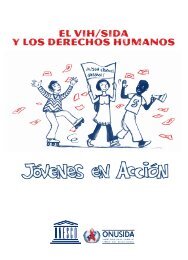the united republic of tanzania health sector hiv and aids strategic plan
the united republic of tanzania health sector hiv and aids strategic plan
the united republic of tanzania health sector hiv and aids strategic plan
Create successful ePaper yourself
Turn your PDF publications into a flip-book with our unique Google optimized e-Paper software.
Emerging Issues<br />
Private for pr<strong>of</strong>it partners find it uneconomical to conduct HTC-related activities due to factors<br />
such as<br />
o Reduced costs for laboratory service without adequate compensation,<br />
o Transporting samples for quality control without compensation <strong>of</strong> costs involved,<br />
o Perceived additional work to <strong>the</strong>ir <strong>health</strong> care providers without remuneration <strong>and</strong><br />
o Different reporting systems .<br />
Equity, Gender <strong>and</strong> sustainability considerations<br />
Low <strong>and</strong> skewed coverage affecting rural <strong>and</strong> vulnerable populations<br />
More women are accessing <strong>the</strong> HTC. There is need to address male involvement.<br />
Inadequately negotiated exit <strong>plan</strong>s by implementing agents without involving stakeholders at all<br />
levels<br />
Strategic objective<br />
To improve access to <strong>and</strong> use <strong>of</strong> quality HIV testing <strong>and</strong> counselling (HTC).<br />
Strategies<br />
Streng<strong>the</strong>n existing <strong>and</strong> promote <strong>the</strong> establishment <strong>of</strong> HTC including services for children<br />
Develop <strong>and</strong> disseminate appropriate st<strong>and</strong>ard operating procedures (SOP) for HTC to all<br />
<strong>health</strong> <strong>and</strong> non <strong>health</strong> services.<br />
Streng<strong>the</strong>n <strong>and</strong> support HTC as an integral component <strong>of</strong> HIV/AIDS/STI/TB prevention,<br />
control <strong>and</strong> care<br />
Develop Guidelines<br />
o Comprehensive HTC Guidelines<br />
o St<strong>and</strong>ard guidelines for peer educators <strong>and</strong> counselors<br />
Targets<br />
Increased utilization <strong>of</strong> HTC services<br />
Indicators<br />
% <strong>of</strong> people counselled <strong>and</strong> tested<br />
Number <strong>of</strong> HTC services established<br />
% <strong>of</strong> people tested referred to o<strong>the</strong>r services<br />
Key Implementers<br />
MOHSW, PORALG, RHMT, RACC, DACC , CHMT, CACC, ZTC<br />
Intervention Area 3: IEC, BCC programming <strong>and</strong> Stigma Reduction Activities<br />
A. Behavioural Change Communication (BCC) 1<br />
Preamble<br />
Information <strong>and</strong> knowledge are necessary but not sufficient conditions for behavior change. Behavior<br />
change as a process involves knowledge <strong>and</strong> attitudes, a favourable social, cultural <strong>and</strong> physical<br />
environment for <strong>the</strong> expected change to take place. The processes behind what happens are summarised<br />
on <strong>the</strong> figure 5 below.<br />
1 This section heavily borrows from FHI (2002), Behavioural Change <strong>and</strong> Communication for HIV/AIDS: A<br />
43 |FINAL COMBINED-HSHSP 2008-2012: June 24th Strategic Framework<br />
2007










